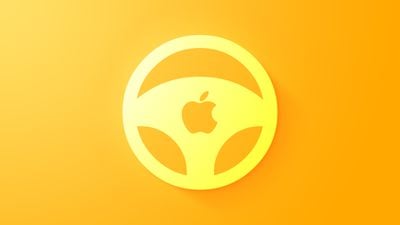Apple Car's Self-Driving System Reportedly Advances, Could Use Sensors From iPhone LiDAR Supplier
Apple has made advancements with its self-driving system and could use LiDAR sensors from Wenmao, Economic Daily News reports.

Apple has reportedly improved its vehicle project's self-driving capabilities and is expanding testing. The self-driving system apparently heavily relies on LiDAR sensors, which Apple may source from Chinese supplier Wenmao – a supplier that already provides LiDAR scanners for the iPhone and iPad Pro. While the company may take some time to develop capacity for automotive-grade LiDAR sensors, Wenmao's quality and existing relationship with Apple could make a partnership likely. Apple is likely to choose long-term supply chain partners like Wenmao early in the development process.
Another Economic Daily News report says that Apple supplier Foxconn's collaboration with German industrial giant Siemens to make advanced driver assistance systems could align with Apple's automotive strategy. Taiwanese companies like Foxconn are believed to have sufficient production capacity to build the vehicle. Apple is expected to continue testing until the car is a viable consumer product.
A major recent report from Bloomberg claims that Apple has scaled back its initial vision for the vehicle and dropped its proposed $120,000 price point, eliminating ambitions for a full self-driving system with no steering wheel or pedals, and an interior design focused on communal seating. Now, the car is expected to have a much more conventional design with more limited self-driving capabilities, for a price under $100,000. The car is now expected to launch around 2026.
Popular Stories
While the iPhone 17 Pro and iPhone 17 Pro Max are not expected to launch until September, there are already plenty of rumors about the devices.
Below, we recap key changes rumored for the iPhone 17 Pro models as of April 2025:
Aluminum frame: iPhone 17 Pro models are rumored to have an aluminum frame, whereas the iPhone 15 Pro and iPhone 16 Pro models have a titanium frame, and the iPhone ...
Apple may have updated several iPads and Macs late last year and early this year, but there are still multiple new devices that we're looking forward to seeing in 2025. Most will come in September or October, but there could be a few surprises before then.
We've rounded up a list of everything that we're still waiting to see from Apple in 2025.
iPhone 17, 17 Air, and 17 Pro - We get...
Apple is preparing a "bold" new iPhone Pro model for the iPhone's 20th anniversary in 2027, according to Bloomberg's Mark Gurman. As part of what's being described as a "major shake-up," Apple is said to be developing a design that makes more extensive use of glass – and this could point directly to the display itself.
Here's the case for Apple releasing a truly all-screen iPhone with no...
Apple's upcoming foldable iPhone (or "iPhone Fold") will feature two screens as part of its book-style design, and a Chinese leaker claims to know the resolutions for both of them.
According to the Weibo-based account Digital Chat Station, the inner display, which is approximately 7.76 inches, will use a 2,713 x 1,920 resolution and feature "under-screen camera technology." Meanwhile, the...
A common complaint about the iPad Pro is that the iPadOS software platform fails to fully take advantage of the device's powerful hardware.
That could soon change.
Bloomberg's Mark Gurman today said that iPadOS 19 will be "more like macOS."
Gurman said that iPadOS 19 will be "more like a Mac" in three ways:Improved productivity
Improved multitasking
Improved app window management...
Apple is working on a new version of the Vision Pro with two key advantages over the current model, according to Bloomberg's Mark Gurman.
Specifically, in his Power On newsletter today, Gurman said Apple is developing a new headset that is both lighter and less expensive than the current Vision Pro, which starts at $3,499 in the U.S. and weighs up to 1.5 pounds.
Gurman said Apple is also...
The first iOS 19 beta is less than two months away, and there are already a handful of new features that are expected with the update.
Apple should release the first iOS 19 beta to developers immediately following the WWDC 2025 keynote, which is scheduled for Monday, June 9. Following beta testing, the update should be released to the general public in September.
Below, we recap the key...
Apple has confirmed that it will be permanently closing its retail store in the heart of Bristol, England, and there is no replacement in sight.
Apple Bristol in 2023
Apple Bristol will be closing its doors on Saturday, August 9, due to redevelopment plans at the Cabot Circus Shopping Centre, and the adjacent Bristol Shopping Quarter. According to news reports, and a building application, the ...
Apple in October 2024 overhauled its 14-inch and 16-inch MacBook Pro models, adding M4, M4 Pro, and M4 Max chips, Thunderbolt 5 ports on higher-end models, display changes, and more. That's quite a lot of updates in one go, but if you think this means a further major refresh for the MacBook Pro is now several years away, think again.
Bloomberg's Mark Gurman has said he expects only a small...
![]()























